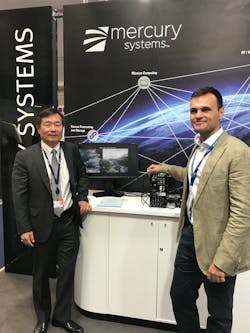Artificial intelligence: AI’s increasing role in autonomous aircraft technology
FARNBOROUGH, England – Running 16-20 July, the Farnborough International Showprovides an immense, interactive, and up-close look at the latest enabling technologies for commercial aviation, general aviation, and military aviation.
While here at the show, I’ll be providing a look at some of the most relevant technologies and news items I encounter throughout the tradeshow grounds. Two such topics, artificial intelligence and deep learning—which proliferate far beyond the realm of aerospace—popped up early in the day on Monday at the Mercury Systems booth.
With a clear focus on automating the process of testing and analysis using artificial intelligence (AI), Mercury Systems suggests that AI technology will be used for much more than what some people think, and soon.
"People will have a much better idea of what AI can be used for soon," said Ike Song, Vice President, General Manager, Mercury Mission Systems. "All manner of missions are getting smarter and fully autonomous platforms, in both the commercial and defense domains are very close. All require massive on-platform processing capability and flight-safety certification."
Realizing this, Mercury Systems has been working with Daedalean, a Zürich, Switzerland-based startup developing artificial intelligence software for autonomous flight control for the electric personal aircraft of the near future.
While Mercury Systems provides the safety-critical hardware, Daedalean provides the software. Their AI and machine learning-based software, according to Boris Videnov, Systems Engineer, Daedalean, provides capabilities including drone detection, landing guidance, and wire detection. It also enables 3D mapping and the ability to interpret “where and what things are,” he said.
"For our software to be deployed, we require processing hardware that meets flight safety-critical requirements, that is small, light, and powerful," said Videnov.
Song also noted that the software is currently running on an existing Mercury Systems platform, but the company is developing a modified version of the hardware for Daedalean that offers different I/O and is smaller and lighter. The live demo saw the AI software running on a Mercury Systems ROCK-2 low-SWaP 3U OpenVPX chassis subsystem with up to four Freescale QorIQ P3041 processors and optional Intel Core i7 processor.
